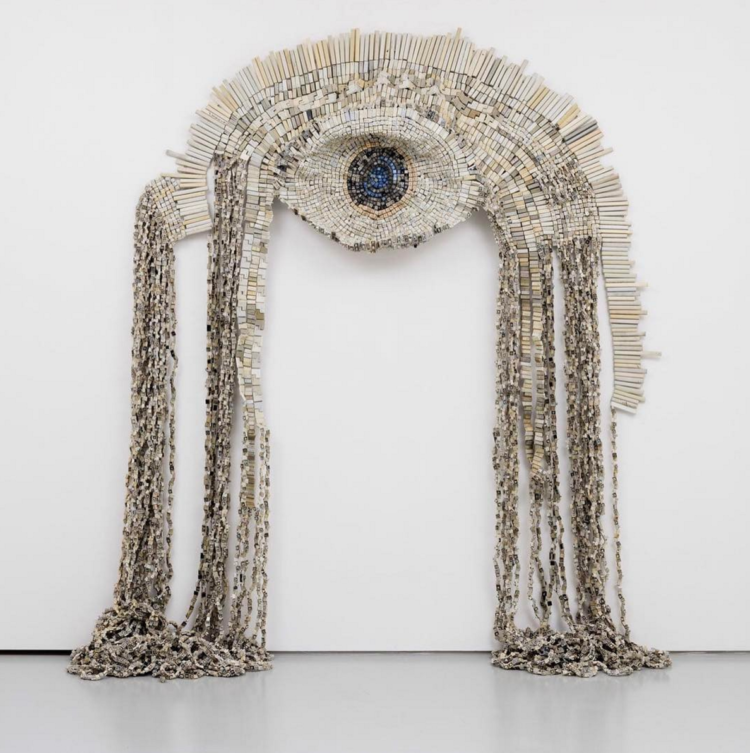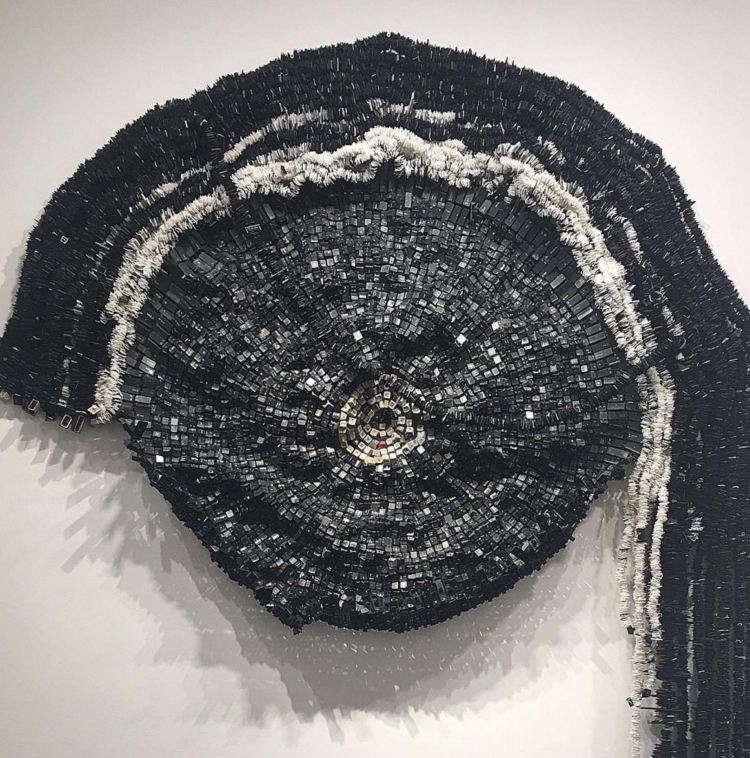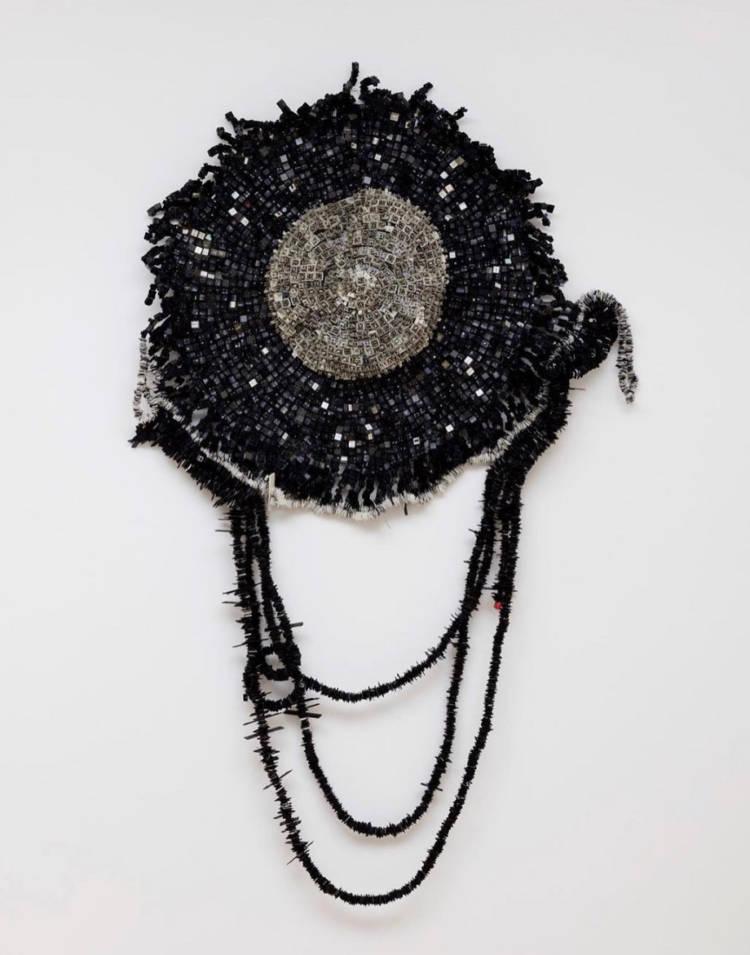His demeanour is unassuming. He is shy and quiet. Yet Moffat Takadiwa has an intriguing aura that commands attention.
His large-scale, intricate works are the result of his inner personality: bold, detailed, meaningful, resourceful and beautiful.
I always wanted to be an artist. That’s why I was a lonely child. I would find solace in just drawing.
They say superheroes have quiet alter egos in order to hide among ordinary folk. In that case, Moffat is a superhero. He is secretly living among us as a normal man, but when he creates that is when we see he is special.
https://www.instagram.com/p/BRrXD4IhVOg/?taken-by=_trueafrica
I am sitting with him in central London in anticipation of his second solo exhibition in the city. He is a long way from home and jokes that Emma (who owns the Tyburn Gallery) is worried that he will get lost on his way back to his hotel. But he is very sure of where it is. Kind of.
‘It is somewhere in that direction,’ he says, pointing towards Oxford Circus, ‘I remember a square.’
‘In Soho?’ I ask
He shrugs. This is the nonchalant, temperament of contemporary African art’s new cool kid on the block.
‘I’ll find it’ he says with confidence.
Say Hello to English is the title of his new body of works that will be showing at Tyburn Gallery until the 6 May 2017. Takadiwa is interested in language, in particular the English language within Africa and its links to colonialism, and the deconstruction of native African languages.
https://www.instagram.com/p/BRqwgLkA_h7/?taken-by=afropolitancollector
We sit down outside the gallery to have a chat in the crisp but sunny London evening over a couple of apple juices. I am not drinking due to my current ‘detox’, and he is not drinking because ‘we wouldn’t like him if he did.’ It is always the quiet ones!
Hello Moffat. How many languages can you say ‘hello’ in?
In my language, Shona, well Shona has many many dialects and I can speak at least six dialects
Do you want to say ‘hello’ to me in one and I say ‘hello’ in a language I know?
Okay I can use the Shona street lingo which is ‘Ndeipi’
That’s like ‘What’s up?’
Yeah exactly.
Kedu?
What’s that?
‘How’s it going’ in Igbo, an east Nigerian language. Were you one of those kids, when you were younger, that used to have a secret language with your friends or invisible friends? I did!
No, I was sadly very lonely as a kid
[awww Moffat]
I am a very reserved and shy person
[He smiles]
https://www.instagram.com/p/BRqx9tjA-yi/?taken-by=afropolitancollector
So when did the art thing start for you? When did you know you wanted to be an artist?
I always wanted to be an artist. That’s why I was a lonely child. I would find solace in just drawing. So I’d be drawing and drawing.
When did it become a vocation rather than just something you did by yourself?
After college, thats when I started showing my art around but a Zimbabwean gallery is like… you know. Emma–Tyburn Gallery owner–saw my work in Cape Town because I had a relationship with a gallery there and I believe she bought one of my works and then decided to represent me.
So talking about your art work, you have these amazing installations. These huge pieces have keyboards and intricate parts of computers among other things… How do you find all these recyclable parts? Are there like a million computers in a dump in Zimbabwe we don’t know about?
I have a team of people I work with. Some of them.. actually, most of them are involved in working in the dumps. They are garbage people. Garbage collectors. So I work with a lot of garbage collectors and a lot of people in my studio and they are the ones that help me collect these materials.
But I recently had this particular interest to have a solo show only with computer keys because of my researches and what I have been reading – like Ngũgĩ wa Thiong’o’s book Decolonising the Mind.
What is the book about?
It is basically talking about how maybe African languages are fading and are being pushed out by English for instance. English being not only a language but also a culture.
Is this something you believe yourself? Do you think the colony languages like English or even French are making African languages secondary or subsidiary?
I’ve got mixed feelings with this… Even the word ‘decolonising’. English and French etc. are now a part of our history in Africa.
We can use them for our own good. We can ‘Africanise’ them.
I think so, in Nigeria for example, there isn’t only just slang but colloquial language – and the way people speak with English, especially young people. Pidgin English is a separate language infused with English and the local Yoruba language.
Yeah, it is an advantage to be born with an international language and your mother tongue, growing up with both at the same time. But when we speak of language killing a culture, we also need to deeply look into it more than just the speaking.
https://www.instagram.com/p/BRtf8cWgVoD/?taken-at=419955111728689
You don’t think African languages carry culture too?
Oh no, of course they do
So the book says that the English culture is overpowering African culture through language?
Yes, and also in my works which then tie into consumables and products. They also help spread culture and were used as tools for colonisation.
Is this why you decided to use computers?
Yes, it represents, primarily, a tool for writing. There is also this recent movement that is happening in South Africa, the ‘Rhodes Must Fall’ protest movement questioning the validity of Western education in Africa.
Students were destroying a lot of things, burning down libraries and so on, decolonising their academia. And I feel like I want to take part in my own way, although I am questioning that movement also.
Before, in the history of Africa, a lot of students died demonstrating for languages. And now, in my own generation, we have got students that are demonstrating again against languages, against that sort of thing.
So I went into the streets and into the dumping sites with my team and we collected these computer keys, about two to three months collecting for these works. The computer keys are like libraries and are like writing instruments. They meant quite a lot to me and I destroyed them. Physically. And I unplugged the keys, and then we used them to fabricate my own language.
I destroyed a colonial language. They belong to a different generation. The older generation.
https://www.instagram.com/p/BRshKWLlizz/?taken-by=tyburngallery
I like the way you destroyed a language to make your own language. That’s a very cool concept.
Thank you
Not bad for a lonely kid
[He smiles]
Moffat will be exhibiting at Art Paris Art Fair on 30 Mar – 2 Apr 2017 and 1:54 Contemporary African Art Fair, NYC edition on 5 – 7 May 2017
© Moffat Takadiwa, courtesy of Tyburn Gallery



